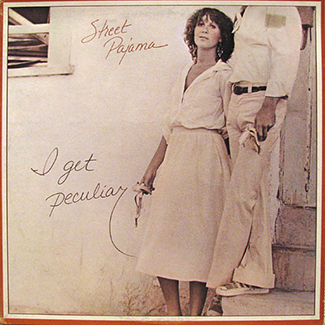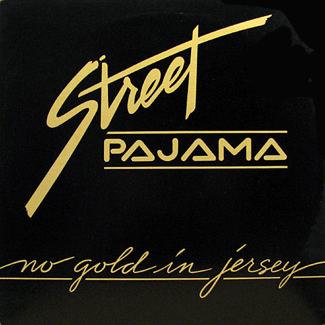

 And now a word about Street Pajama.
Those were some crazy times and you can revisit some of them here.
And now a word about Street Pajama.
Those were some crazy times and you can revisit some of them here.
And now some back story. The band was founded by Gorgas "Limestone
Teeth" Crowley - also known as the Fourth Wise Man, in the year 0.
"I was almost one of the Three Kings," he reportedly said.
"I had the robe, the hat, the camel - the whole bit, but I was rejected
because I didn't have a beard." He auditioned again, this time with
a smoking jacket and a soul patch and was named as an alternate, and then
- through a clerical error - he was assigned to be the bass player for
Melchior and the Three Wise Guys. The band was a drag and when a mysterious
light appeared in the west he ditched his gig and followed a star that
led to a bath house in Tarsus. There he was wrapped in swaddling clothes
and beaten by a shepherd.
"And when I woke up," he said, "I was writing songs for
Street Pajama."
 This is the proud beginning. By 1976
the Street Pajama torch was carried by two itinerate minstrels from Pittsburgh.
Mike King and Merle Harmon were on the road in the Midwest where they
were fired repeatedly for their paucity of country music and their apathetic
version of Bad, Bad Leroy Brown. But the music continued and they soldiered
on bravely through what can only be described as a difficult minstrel
cycle.
This is the proud beginning. By 1976
the Street Pajama torch was carried by two itinerate minstrels from Pittsburgh.
Mike King and Merle Harmon were on the road in the Midwest where they
were fired repeatedly for their paucity of country music and their apathetic
version of Bad, Bad Leroy Brown. But the music continued and they soldiered
on bravely through what can only be described as a difficult minstrel
cycle.
Later that year they left the Dakotas and came to sunny Tucson where they
wrote and recorded three albums: I Get Peculiar, No Gold in Jersey, and
Beast de Resistance - and although it is clearly obnoxious to point it
out, two of the albums were number one sellers in Tucson, and one of the
songs (Screwed Again) was number one on KRQ for three weeks while Beat
It, by Michael Jackson, was number two. This is an actual fact. On a more
sobering note, Screwed Again fell to number 67,876,402 the following week
and the song's success served as little more than bragging rights as they
spoke to other bands who were making far more money.
 By the 1990's, bookings had dried up
and friction in the band became a serious issue. Band members began attacking
each other with blunted instruments, and then - with instruments that
were sharpened to a point. Soon, the music could barely be heard over
the sound of small-arms fire. And although this may have negatively impacted
upon the internal harmony of the band, it is important to point out that
their music became increasingly percussive.
By the 1990's, bookings had dried up
and friction in the band became a serious issue. Band members began attacking
each other with blunted instruments, and then - with instruments that
were sharpened to a point. Soon, the music could barely be heard over
the sound of small-arms fire. And although this may have negatively impacted
upon the internal harmony of the band, it is important to point out that
their music became increasingly percussive.
Then, like King Tut, the band expired amidst a great wailing and gnashing
of teeth. Or at least that's how it felt to this writer. And what would
Yowza "Shout it Out" Crowley* - (yes, dear readers, of the same
Crowley lineage as the founder) - say about that? Well, frankly, he would
weep.
But that's showbiz.
*Yowza Crowley rocketed to prominence with his enigmatic
laugh at the beginning of the 1962 hit Wipeout.
But his career was just beginning. While touring with Tito Cachita, a
Latin orchestra leader best known for executing his maraca players during
the final set, he began to distinguish himself with percussive grunts
that quickly became part of the mambo language. He then landed a gig as
a growler in the 1981 hit Love Machine,
but critics were unimpressed, accusing him of "vocal timidity and
a lack of audible saliva." He attempted a comeback with a series
of high pitched yips and giggles in Candle in
the Wind, but was pulled from the studio by Elton
John and his personal bouncer, Tito Cachita.
Street Pajama thru the years:
Guitar - Mike, Merle Harmon, Mark Usvolk
Bass - Bill Poutenen, Charlie Bingo, Gene the Carpeted Giant, Jim Miller,
Brian Bromberg, Mark Usvolk, Jim Simmons, John Kelly, Jeff Masterson
Drums - Ralph Gilmore, Mike Brorby, John Canfield, Will Clipman, Glenn
Olsen, Jerome Kimsey
Keyboards - Lance Kaufmann, Lamont Arthur
(If you were in the band, and let's face it - who wasn't? - give me a
shout if I left out your name.)
